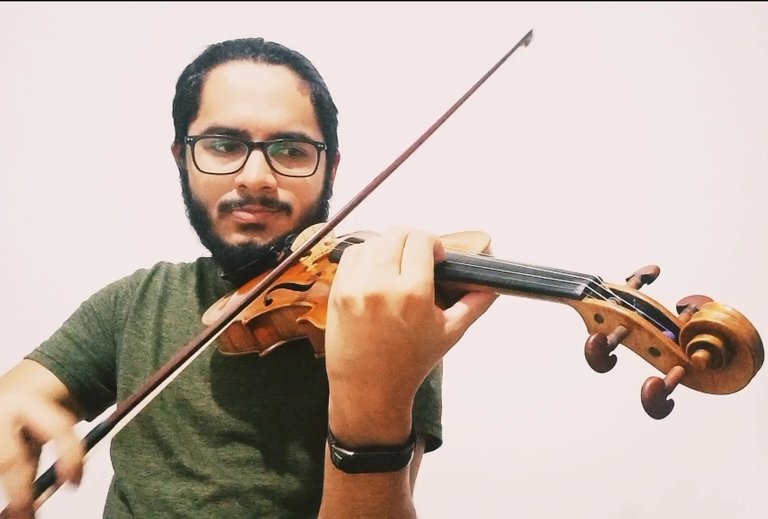Luego de la afinación, velocidad / After tuning, speed

Hola queridos y apreciados amigos, espero estén de lo mejor el día de hoy
El día de ayer, al finalizar el día les traje y les mostré un poco lo que es uno de los procesos más complejos y extensos en la música, específicamente en los instrumentos de cuerda frotada, la afinación.
Digo que para éste tipo de instrumentos es más complejo pero una cosa en especial: no hay trastes (cómo en la guitarra, mandolina, cuatro) ni teclas (cómo en el piano), y al no tener ninguna de esas cosas la guía es más difícil de tener porque básicamente termina siendo el mismo oído,
Otro proceso que es complejo, para todos los instrumentos, es el de estudiar un fragmento de concierto, pieza, capricho o lección donde tengamos que tocarlo a una velocidad rápida determinada.
En general siempre para tener algo a una velocidad rápida hay que partir desde lo básico, la lentitud,
Un ejemplo que puedo darles es que cuando nosotros estamos aprendiendo sobre algo, en la escuela, universidad, donde sea, siempre la mejor forma de aprender es lento. A nosotros el profesor no nos habla rápido, sin darnos tiempo para retener la información, todo lo contrario,
Y lo mismo pasa en la música. Antes de interpretar algo rápido hay que estudiarlo lento, con mucha paciencia,
Ésto es algo que es global, universal, porque así funciona nuestra mente. Todos los músicos que hemos visto y escuchado tocar muy rápido, para terminar haciendo esas melodías rápidas a esa velocidad justamente empezaron así... Lento.
Es por ello que para todos estos tipos de cosas hay que conocer la mente en general y también conocer qué nos beneficia cómo individuos, porque también hay cosas que nos ayudan a unos y a otros no.
Así que sin más que agregar por éste post espero disfruten y vean la diferencia de ambas velocidades, ¡Abrazos!
/

Hello dear and appreciated friends, I hope you are having the best today
Yesterday, at the end of the day, I brought you and showed you a little about one of the most complex and extensive processes in music, specifically in bowed string instruments, tuning.
I say that for this type of instrument it is more complex but one thing in particular: there are no frets (as in the guitar, mandolin, four) or keys (as in the piano), and by not having any of those things the guide is more difficult to have because it basically ends up being the same ear,
Another process that is complex, for all instruments, is to study a fragment of a concert, piece, whim or lesson where we have to play it at a certain fast speed.
In general, to always have something at a fast speed, you have to start from the basics, slowness,
An example that I can give you is that when we are learning about something, at school, university, wherever, the best way to learn is always slowly. The teacher does not speak to us quickly, without giving us time to retain the information, on the contrary,
And the same thing happens in music. Before interpreting something fast, you have to study it slowly, with a lot of patience,
This is something that is global, universal, because that is how our mind works. All the musicians that we have seen and heard play very fast, to end up making those fast melodies at that speed just started like this... Slow.
That is why for all these types of things you have to know the mind in general and also know what benefits us as individuals, because there are also things that help some and not others.
So without further ado for this post I hope you enjoy and see the difference between both speeds, hugs!
¡Felicitaciones!
1. Invierte en el PROYECTO ENTROPÍA y recibe ganancias semanalmente. Entra aquí para más información.
3. Suscríbete a nuestra COMUNIDAD, apoya al trail de @Entropia y así podrás ganar recompensas de curación de forma automática. Entra aquí para más información sobre nuestro trail.
4. Creación de cuentas nuevas de Hive aquí.
5. Visita nuestro canal de Youtube.
Atentamente
El equipo de curación del PROYECTO ENTROPÍA
Your post has been supported and upvoted from the Classical Music community (Subscribe at peakd) as it appears to be of interest to our community. We also support jazz and folk music posts!
If you enjoy our support of the #classical-music community, please consider a small upvote to help grow the support account!
You can find details about us below.
The classical music community at #classical-music, Peakd and Discord. Follow our community accounts @classical-music and @classical-radio or follow our curation trail (classical-radio) at Hive Vote!